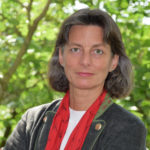IFSA 2020 Conference
Keynote SpeakersThe presentations by the Keynote Speakers at the IFSA2022 are available here:
Helena Freitas |
Sérgio Schneider |
Jørgen Primdahl |
Ika Darnhofer |
HELENA FREITAS (PT) - Agriculture and territorial cohesion in Portugal: an ecological and political perspective
 Helena Freitas received her PhD in Ecology from the University of Coimbra, in collaboration with the University of Bielefeld, Germany, in 1993, and did postdoctoral studies at Stanford University, USA, between 1994 and 1996. She is Full Professor of Biodiversity and Ecology at the Department of Life Sciences of the Faculty of Sciences and Technology of the University of Coimbra since 2003, and holds the UNESCO Chair in Biodiversity and Conservation for Sustainable Development since 2014.
Helena Freitas received her PhD in Ecology from the University of Coimbra, in collaboration with the University of Bielefeld, Germany, in 1993, and did postdoctoral studies at Stanford University, USA, between 1994 and 1996. She is Full Professor of Biodiversity and Ecology at the Department of Life Sciences of the Faculty of Sciences and Technology of the University of Coimbra since 2003, and holds the UNESCO Chair in Biodiversity and Conservation for Sustainable Development since 2014.
Helena Freitas joined the General Council of the University of Coimbra (2009-2011), was Director of the Botanical Garden of the University of Coimbra from 2004 to 2012, having prepared and coordinated her requalification program, President of the League for the Protection of Nature (1999 -2002), founder and President of the Portuguese Society of Ecology (2004-2013) and Vice-President of the European Society of Ecology (2009-2012). She is currently Coordinator of the Center for Functional Ecology – science for people and the planet, Scientific Coordinator of FitoLab – Phytosanitary Laboratory of the Pedro Nunes Institute, and is part of the Scientific Council of the Department of Life Sciences of the University of Coimbra. The scientific areas of specialty are related to: Ecology; Mediterranean Ecosystems; Forest and Agriculture; Ecology and Management of exotic and invasive species; Conservation of Nature, Biodiversity; Physiology of the tree; Diversity of Plants and Fungi; Tolerance to Stress and Bioremediation; Environmental policy; Bioenergy; Conservation of Nature; Microbial ecology; Ecology and Society.
Agriculture and territorial cohesion in Portugal: an ecological and political perspective
The Portuguese agro-food sector faces a number of threats, including climate change, globalization of goods and services and land use changes related to the abandonment of primary activities among the most worrying. Climate change scenarios for Portugal point to progressively more unfavourable conditions for agriculture, resulting from the reduction of precipitation and temperature increase, the worsening of the frequency and intensity of extreme weather events, the increased susceptibility to desertification and the favourable conditions for harmful biotic agents, evidencing the need to foster the resilience of territories through measures to adapt to changing conditions.
Agriculture will continue to be very diverse, highly dependent on what access to land may be but desirably thought of a land-use logic (agro-ecological zoning) that anticipates the effects of climate change. It is also essential to take into account the specificity of the territories, providing public support to farms, and devoting resources to the development of the territory where family farming prevails, recognizing the reality of the productive structure of these regions, in particular the environmental and social importance of multi-income agriculture.
The paradigm shift requires other policies, favouring territorial action, encompassing all explorations, and in harmony between these and the other sectors of activity. Only at this scale is it possible to make the necessary investments in applied research, with the support of the scientific and technological system, by providing the technology, innovation and knowledge necessary for the transformation and sustainability of family farming. The natural and progressive qualification of family farming will eventually drive other equally relevant areas, in particular the design of innovative cooperatives, the establishment of appropriate producer organizations, and proximity markets. Placing family farming at the centre of the sector’s public policies is a fundamental strategic movement for the cohesion and sustainability of the territory, for the wellbeing of the Portuguese, for the preservation of the environment and for the safeguarding of biodiversity.
JØRGEN PRIMDAHL (DK) - Collaborative strategy making for agrarian landscapes
Jørgen Primdahl is professor in Countryside Planning and Management at Department of Geoscience and Natural Resource Management, University of Copenhagen. His background is landscape architecture with a ph.d. in landscape planning and planning theory. He is a fellow at the Centre for Land, Environment, and People (LEAP), Lincoln University, New Zealand and has been member the Danish governmental expert commission on Nature and Agriculture and the Danish Nature Council. Member of the Editorial Board, Danish Journal of Geography. His main research interest is the rural landscape (patterns, functions, and change) and the roles of public policy interventions. Recently he has published on the rural-urban fringe; multifunctionality in rural landscapes; the farmer as landscape manager; impact models for agri environmental policy making; intersecting dynamics of agricultural structural changes and urbanisation; globalisation and the agricultural landscape; landscape strategy making as an approach to collaborative governance. As programme leader and action researcher he has been involved in more than 20 experimental planning projects for rural landscapes.
Collaborative strategy making for agrarian landscapes
The agricultural landscape is affected by a multitude of public policies linked with climate change, biodiversity conservation, environmental protection, rural development, land and food markets, and urbanization in various forms including counter-urbanization. These policies are handled by different policy domains and as a rule, they are segregated when it comes to aims, instruments and budgets. However, inevitably the policies will meet and integrate – no matter how poorly or mal-functional it may be. If not before, this will happen as the policies hit the ground at the farm level. Although the individual farmer – as a producer and as a land owner – is a main policy target, coordination at the landscape scale is often required. Moreover, the farmer is also a key expert when it comes to knowledge of the specific conditions for farming as well as a key stakeholder concerning the values of the landscape as a living place. Using the unifying dimension of the landscape concept a ‘landscape approach’ has been suggested – and widely accepted – to integrate different policy domains through collaborative processes and to balance competing land use demands to satisfy both ecological and human demands. Landscape strategy making represents a way to bring together the different components of a landscape approach. Based on experiences with experimental projects and inspired by spatial planning theory a framework for landscape strategy making is outlined and illustrated by a fresh example of a strategy for a Danish river valley dominated by agriculture.
SERGIO SCHNEIDER (BR) - The contribution of family farming to foster sustainable food systems
Sergio Schneider is Full Professor of Sociology of Rural Development and Food Studies at the Federal University of Rio Grande do Sul (UFRGS), Porto Alegre, Brazil, where he teaches and research at the Graduate Program of Sociology (PPGS) and Rural Development (PGDR).
Since 2003 Sergio Schneider has a research scholarship from CNPq (National Council for Science and Technology from Brazil) for high scientific productivity in social science research.
Sergio Schneider has a degree in Social Sciences (1990), and Master (1994) and PhD (1999) in Sociology. He was PhD visiting academic at LADYSS, Université Paris-X, Paris/France, with Hugues Lamarche (1997-1998). He also was Fellow and Academic Visitor Scholar at CPLAN, Cardiff University/Wales/UK (2007-2008), with Terry Marsden and Visiting Professor at Centre for Food Policy (CFP), City London Univesity, UK (2015-2016), with Tim Lang.
Since 1995, he works at the Federal University of Rio Grande do Sul, Department of Sociology, where he teaches courses on rural sociology, development sociology and sociology of food at Graduate Master and PhD level. His main research topics are food issues, rural development, food security, rural non-agricultural activities, family farming, territorial development and rural and food policies.
Sergio Schneider is currently deputy President of IRSA (International Rural Sociology Association) and was president of SOBER (2011-2013), the Brazilian Society of Economics, Sociology and Rural Administration and Vice President of ALASRU (2014-2018), the Latin American Association of Rural Sociology. He acts as a reviewer of scientific journals in Brazil and abroad. He is a consultant to national and international organizations on rural development, agriculture and food (FAO, WHO, IFAD, IICA, WHO, CIRAD, European Union).
The contribution of family farming to foster sustainable food systems
The presentation will address the challenges and perspectives of the family farming in a globalized world in which the food production and consumption has become a system dominated by global value chains upstreams and a small handful of supermarkets downstream. Family farming might be the best way to develop a sustainable agriculture committed with the SDGs and the nutrition transition, in line with a agriculture sensitive to nutrition approach and the new demands from the urban people. The key argument I would like to address is that family farming has great potentialities to develop sustainable food systems, which is an emerging concept that can be critical in the context of the Decade of Family Farming, just launch by FAO.
IKA DARNHOFER (AT) - Challenges for Farming Systems Research: learning from experience and looking ahead

Ika Darnhofer is associate professor at the Institute of Agricultural and Forestry Economics at the University of Natural Resources and Applied Life Sciences in Vienna. After completing her studies in agricultural economics she spent a few years in the private sector before returning to academia in 2000. Her research focuses on management and decision making on family farms. Over the years her work moved from economic modelling towards qualitative approaches in rural sociology. Her focus is on resilience of farms, i.e. how they manage to persist over the long-term by adapting and transforming their perceptions of opportunities, their use of resources, and their activities. The focus on resilience is strengthened by the recognition that we live in turbulent times. Family farms thus need a high level of adaptive capacity to cope with rapid and often unpredictable change as well as with the ambiguity and contradictions in consumer’s demands and social expectations. She is a member of the editorial board of the ‚Journal of Rural Studies‘, of ‘Agricultural Systems’ and of ‚Agriculture and Human Values‘. She has been deeply involved in the IFSA since 2008: as a member of the executive committee, organising the IFSA Symposium in Vienna in 2010, maintaining the IFSA website, and co-editing the book ‘Farming systems Research into the 21st century: The new dynamic’.
https://boku.ac.at/wiso/afo/darnhofer/
Challenges for Farming Systems Research: learning from experience and looking ahead
Farming Systems Research has always strived to integrate both natural and social sciences, taking into account agricultural production methods and farmer’s views. This integration is rarely easy, but crucial. As the current discussion on climate change or the unsustainable use of natural resources shows: it is easier to study and present the scientific facts about agro-ecosystems, than to motivate people to adapt their practices. Yet, to face the impacts of climate change and to manage our resources sustainably, we will need to change our practices, both in research and in society at large. In the closing plenary I will build on the presentations and discussions held at the IFSA 2020, reflecting on the progress we have made over the past decade or so, and identify some issues that would merit more attention within farming systems research.
